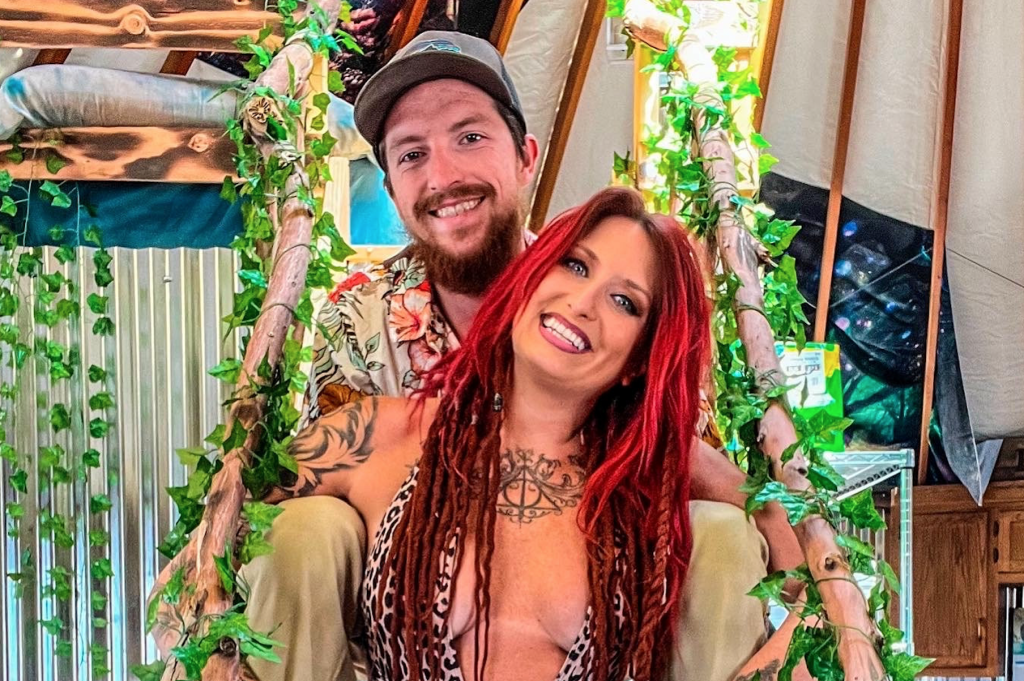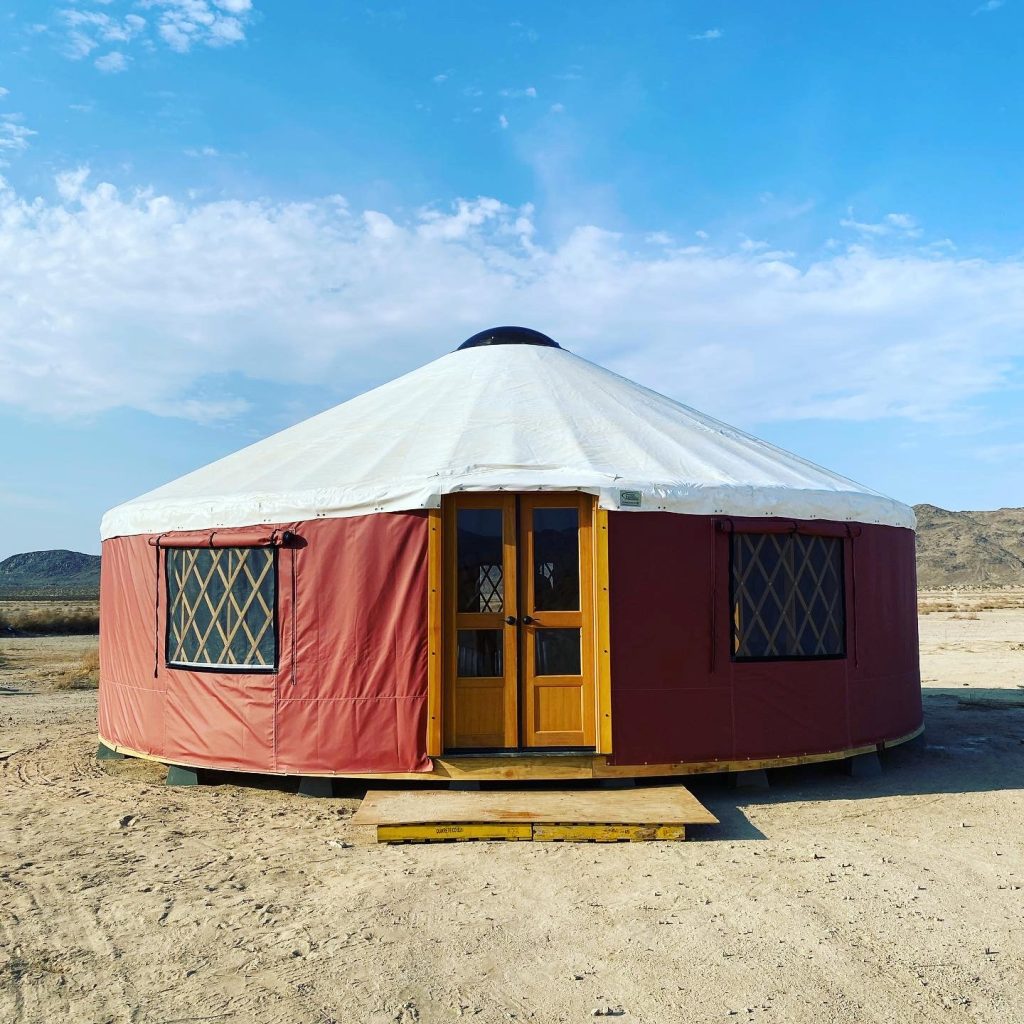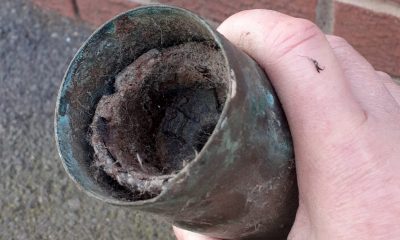Lifestyle
This couple left the city to live in a tent in the desert
"Our happy times outweigh the bad ones by a million."
Published
1 year ago onBy
Talker News
By Jake Meeus-Jones via SWNS
This couple quit city life to live off-grid in a tent in the middle of the desert - and they now recycle their poop and use the gas to cook.
Whitney Newkirk, 33, and her husband, Trent, 26, moved more than 2,000 miles from Milwaukee, Wisconsin, to Joshua Tree National Park, California, in August 2020.
The couple had traveled around US national parks in a trailer for a year but decided to make a permanent move because they wanted to start a new remote life - after Trent lost his job as a mechanical design engineer during the pandemic.
They "fell in love" with Joshua Tree National Park - comprising of two deserts, the Sonoran and the Mojave - and bought a 2.3-acre patch of land for $8k in March 2021 to make into their new home.
The pair bought a custom-designed yurt and invested in a 2,500-gallon water tank.

They get their electricity from solar panels and have a home biogas system - using food and even human waste to create gas - which they use to cook using their fryer and stove.
Trent works from home as a mechanical design engineer for a new company, whilst Whitney runs the couple's social accounts where they document their off-grid lifestyle.
Whitney said: "I never miss civilization, I love people, but I don't like large crowds.
"Now we just feel so much more financially free and closer to nature.
"Our journey so far has helped us gain so much knowledge and is incredibly fulfilling.
"There are still trials and tribulations as we continue on the build and move on to bringing back a desert ecosystem to the outside.
"But I’ve never been happier to do it. Our happy times outweigh the bad ones by a million."
The couple live in a yurt which cost them $20k and required three months of design and planning.
Whitney and Trent drove over 14 hours to pick up the parts from a company in Cottage Grove, Oregon, before spending a further three weeks putting the structure together on their newly acquired land.
They then spent another year renovating and converting the yurt into a liveable space with a bathroom and kitchen.
Now virtually finished with their project, Whitney said she feels like she's on top of the world.
"The best way I can describe the feeling of when we finished was I literally felt like I was standing on the top Mount Everest," she said.
"It felt like the tallest mountain in the world to climb but getting to the top was no greater feeling."
The desert-living duo isn't hooked up to the grid and get their electric from solar panels that they installed themselves, with the full system costing $12k.
Whitney said: "All of the solar equipment comes with how-to guides instead of hiring professional.
"We started buying regular solar panels and batteries, before upgrading to lithium batteries.
"It can run everything normally. It doesn’t affect anything at all.
"Even at night when the sun isn’t shining it uses the battery bank.

"It's life-changing."
Water isn't an issue either, as their 2,500-gallon water tank and water pipe keep them going for four months before needing a refill from a water company.
"We have had to adjust to living with less water but we're still able to shower and wash every day," she said.
"We can do our dishes inside and have enough for our pets to drink as well.
"We do plan on digging a well but it’s expensive and quite dangerous to do on your own."
They plan to install hot water in the coming months as the desert lifestyle has meant they haven't needed it through the summer.
The couple is now able to use gas, after they splashed $1,600 dollars on a home biogas system, which allows them to generate their own gas from food and human waste.
"Basically, a giant bag sits outside, and the pipes run from the bag to the inside," Whitney said.
"The sun breaks the waste down and creates natural gas which then gives you two hours of cooking gas and smells less than regular gas."
Thanks to a weekly farmers market in the nearby town of Joshua Tree, Whitney and Trent are able to stock up on fresh and 'high-quality' produce.
There's a Walmart further down the road for additional supplies.
Their hard work didn't come without setbacks, and Whitney said there was a time she thought it would never happen.
"There was a point where I thought we were crazy. Mainly because a heatwave happened when we started our build and affected the desert temperature to 115 degrees Fahrenheit."
"It's very dry, and you dehydrate very quickly.
"Our travel trailer couldn’t keep up with the heat. That happened for two months, and we thought 'we're not going to get this done.'
"So, we sat in Trent's truck during the day and built at night.
"Finally, we got it up, winter started to hit and, in the desert, it gets very cold at night during winter.
"We didn’t want to be hot again for next summer so we spent winter saving so we could get air conditioning and two solar panel systems."
Whitney says they are now focusing on the outside with plans to build their own greenhouse to start cultivating and growing, as areas of the national park are "green and full of life."
They believe they can sustain themselves for a year from rainwater with a good rainwater catchment system.
Finally, their move turned out to be a good investment as a neighboring patch of land now costs $65k.
Stories and infographics by ‘Talker Research’ are available to download & ready to use. Stories and videos by ‘Talker News’ are managed by SWNS. To license content for editorial or commercial use and to see the full scope of SWNS content, please email [email protected] or submit an inquiry via our contact form.
You may like


One-year-old can’t stop laughing during first ride at Disneyland


Dad running marathon wearing chainmail weighing over 40 pounds


Woman recovers stolen phone after chasing down thief


Woman running London Marathon with 66-pound fridge on her back


Woman regrets her tattoo nightmare: ‘It’s horrendous’


Touching moment brother and sister reunite after 45 years
Other Stories


New breakthrough treatment boosts cancer-fighting cells
The approach involves activating the immune cells in the body and "reprogramming" them to attack and destroy the cancer cells.


One-year-old can’t stop laughing during first ride at Disneyland
"We didn't expect him to love it that much."


Dad running marathon wearing chainmail weighing over 40 pounds
A dad is attempting to break the world record for the fastest marathon while wearing chainmail.


Hero saves elderly couple by dragging them out of burning car
The Good Samaritan jumped into action after spotting the fire on his way to work.


Bomb squad seals off town after ammunition shell donated to charity shop
Staff discovered the device in a bag of donations.
Top Talkers

 Parenting2 days ago
Parenting2 days agoSingle mom details struggles of feeding her 12 kids

 Broadcast4 days ago
Broadcast4 days agoOver 40% of Americans have no clue what a 401k is

 Broadcast3 days ago
Broadcast3 days agoHow hard is it for Americans to live sustainably?

 Broadcast1 week ago
Broadcast1 week agoGrocery shopping hungry is costing Americans this much

 Funny1 week ago
Funny1 week agoCops confused by crow mimicking police siren

 Shopping1 week ago
Shopping1 week agoGrocery shopping hungry costs Americans this much every trip

 Money4 days ago
Money4 days agoOver 40% of Americans have no clue what a 401k is

 Parenting1 week ago
Parenting1 week agoIt takes this many minutes for the average American kid to get bored
